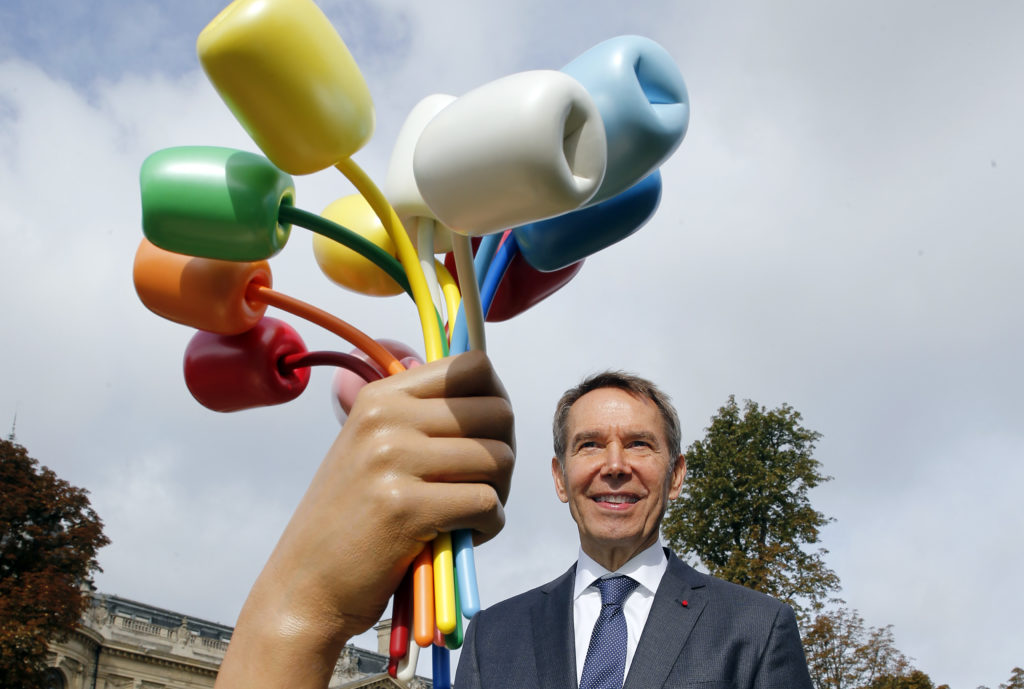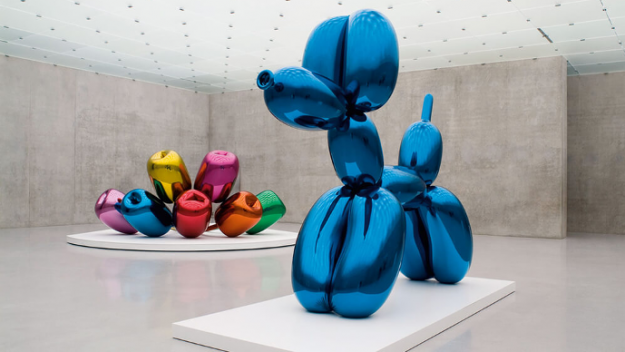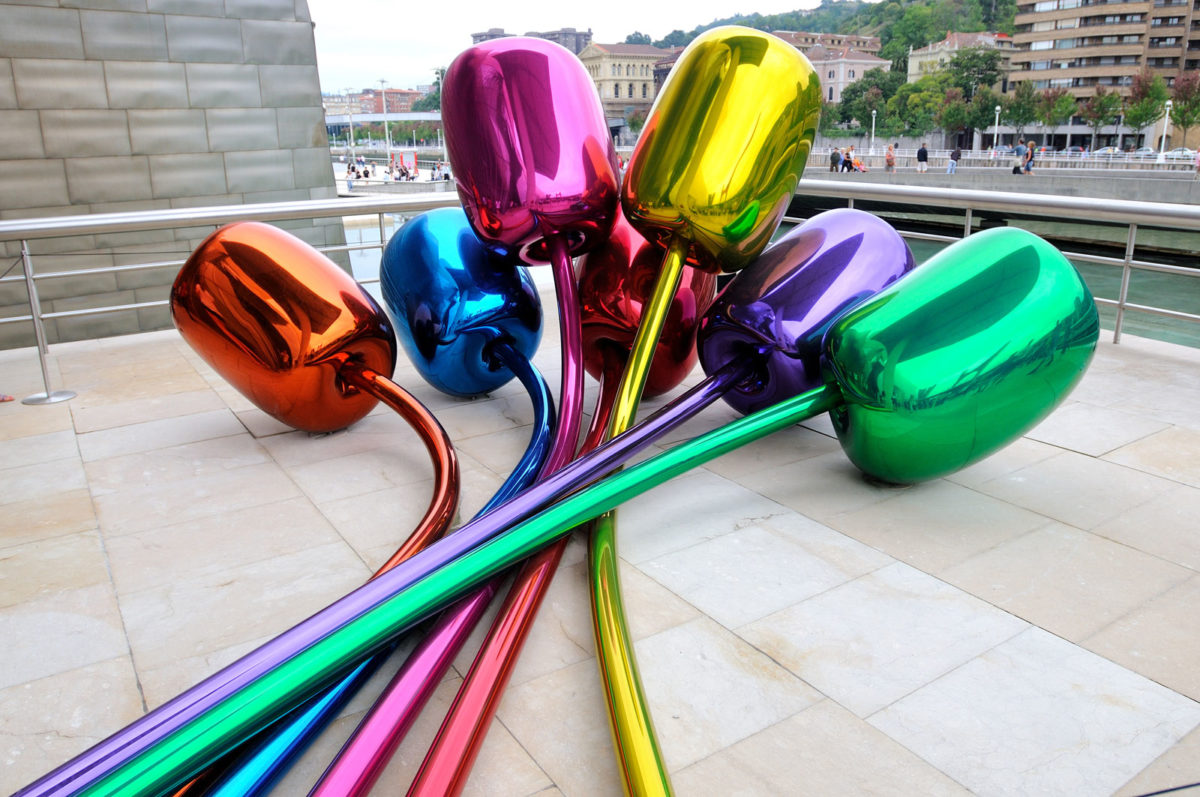The multi-millionaire artist’s new tribute to the 2015 Paris terror attack is not generating the most positive reviews.

No stranger to controversy, Jeff Koons’ latest work, Bouquet of Tulips (2019) is sparking heated debate. Envisioned as a tribute to the 2015 terror attacks, the sculpture has generated disapproval from artists ever since its announcement in January of 2018.
The metal sculpture stands 12.6 metres high in the gardens of the Champs Élysées, between the Petit Palais and Place de la Concorde. The work is a stylistic representation of a bunch of flowers, in Koons’ signature balloon animal art style, held by a huge human hand. It is intended to be a transatlantic gesture of friendship. The hand holding the bouquet references the Statue of Liberty holding the torch. However, this balloon-esque token of friendship is proving to be somewhat unwelcome.
The work has received intense backlash since planning began, wrestling with significant delays when funding became difficult to secure. The multi-millionaire artist agreed to donate the “idea” for the sculpture, but not to pay for the materials. In the end, he pitched in $1 million when the project went over budget.
Back in 2018, artists published an open letter, calling the project “opportunistic, even cynical”. Now, more criticism comes in regard to its placement outside a space dedicated to young emerging artists. Many feel placing the work of an established artist there sends a contradictory message.
Mayor of Paris, Anne Hidalgo, is keeping the conversation civil, calling it “a magnificent symbol of freedom and friendship”.
Plagiarism and Substance

Jeff Koons courts controversy wherever he goes. This is not the first time that Koons, now very much a celebrity, has faced criticism in France.
Last year, he was found guilty of plagiarism. A French court ruled that he copied an idea from a French clothing chain advertisement. The artwork in question was 1988’s Fait d’Hiver, depicting a pig standing over a reclining woman. The work was copied from a campaign for Naf Naf in the mid ‘80s.
Best known for his appropriation of mundane items and pop culture subjects, Koons is an artist representative of the commercial side of the art world. His works infamously sell for gigantic sums of money, including the 1986 sculpture Rabbit, which sold for a record auction price of $91.1 million just this year.
As you would expect, art lovers are divided. His works have become status symbols more than pieces enjoyed purely for art’s sake. For many, he himself is a symbol of late capitalism, and the product of the art world’s voracious appetite for prestige.
Koons’ elevation of the mundane into objects of veneration and desire is nothing new. But his mirror-polished stainless steel balloon animals have garnered a broad perception as vacuous and devoid of substance.
The age-old question stands: does art need to have a meaning beyond pure aesthetic appeal?
In this way, Koons is often compared to Andy Warhol, who remains controversial today. But if he too is an artist plumbing the depths of pop culture in order to expose it, this latest work does not follow along those lines. And still, people dislike it.
“Pornographic”

A survey run by Le Quotidien de l’Art, of gallery owners, readers, and collectors, found that 98 per cent disapproved of the Bouquet of Tulips project.
Attitudes since its reveal have not been much better. French Philosopher Yves Michaud wrote in L’Obs magazine, slamming the artwork as “eleven coloured anuses mounted on stems”, going on to say that it was “in fact a pornographic sculpture”.
One Twitter user, Giles Brandet, called it “eye-candy for philistines”. He added, “I find Jeff Koons’ ‘kitsch neo-pop’ totally devoid of interest.”
Parisians are notoriously unhappy with new additions to the city’s landscape, with the “eyesore” Louvre pyramid that famously shocked the nation turning 30 this year. The trianglular glass entrance is still viewed as a mistake by many city-dwellers.
While unveiling this sculpture, Koons said,
“I did, as a citizen in New York, experience 9/11 and the depression that hung over the city. It really took years for the city to be able to come to life again.”
Koons revealed that 80 per cent of the proceeds gained from the sale of the copyright are going to victim’s families. The rest is dedicated to its maintenance.
The artist told Le Figaro in 2016 that he sees Bouquet of Tulips as an optimistic symbol of hope and the “universal values that the US and France share”. However, with America’s reputation on the world stage at an all-time low, it’s no wonder that the French response has not been favourable.
Time will tell what the legacy of Jeff Koons, and this latest work, will be.
What do you think of the artwork? Let us know in the comments below!







